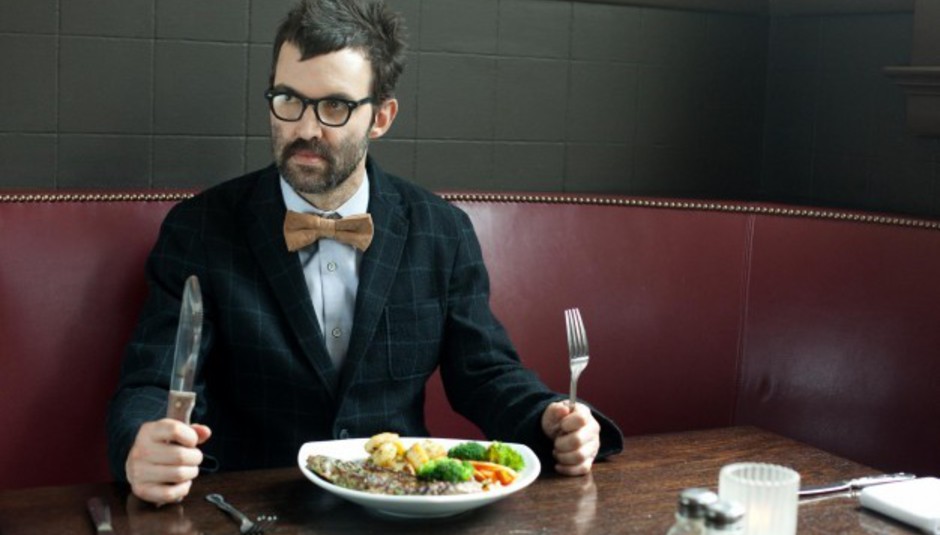Back in 1979, Neil Young addressed worries of his own impending irrelevance on ‘Hey Hey, My My’, acknowledging critics who had accused him of sliding towards the middle of the road with his hit album Harvest and explicitly declaring his intent to arrest the drift.
Such an accusation of burgeoning artistic anonymity isn’t really something that’s ever been levelled at Eels, AKA Mark Everett, AKA E. Still, on ‘Bombs Away’, the opening track to the “band’s” tenth studio album Wonderful, Glorious, he appears to be addressing a similar concern to one of his heroes with the refrain “I’m getting tired of being complacent, I’m getting tired of being a mouse”. When DiS caught up with E in London last November he was quick to allay any fears that, after years of coming to terms with the most traumatic coming-of-age experience imaginable, he hasn’t shifted into any kind of existential quandary.
“That’s one of the songs where I’m writing in a character’s voice. I mean, I am not known for being too ‘mousey’, but I think everyone feels like that sometimes and I do come from a mouse-ish place. I mean, I write a lot of songs in character that has nothing to do with me and then years later I find myself in their exact situation so maybe I’ll find myself with, like, a really overbearing wife and I’ll just be the quiet, complacent husband.”
It’s not surprising to hear E respond to questions about his own fears and insecurities with jokes, but I was expecting him to be far more deadpan than he is; instead his pitch often rises in a way that suggests he’s excited about amusing himself, and is almost unaware that he’s genuinely being funny. Nonetheless, he has addressed similar concerns in the past, most notably on the utterly charming ‘Railroad Man’ from Blinking Lights and Other Revelations in 2004. Now, eight years on in a recording career that’s lasted nearly two decades, it’s only natural that there must be some difficulty in maintaining relevance, especially whilst being seen as the perennial outsider.
“You could apply it to my professional life. I’ve always been a little under-the-radar so I’m always thinking ‘enough of this shit, pay attention!’ It gets harder and harder [to remain fresh and creative] the longer you do it, just because you’ve done more stuff before. It’s hard for all of us though, because we were all born too late, I mean, everything was already done! It is getting harder and harder for me to write something that doesn’t make me go ‘you know this really reminds me of something else.”
Wonderful, Glorious certainly feels different to any of Eels’ previous work, both more eclectic and more relaxed. It was recorded at E’s new studio in Los Angeles, where he has lived since just before recording début album Beautiful Freak. “One thing you can do, that was almost impossible in the little basement where we recorded the other records, is that we can set up and play together as a live band rather than build it piece-by-piece if we choose to. You get certain energy from that that you can’t get from the ‘building block’ process.
“It’s an extremely collaborative process. I wouldn’t say it was democratic as I’m still the boss, the guy that filters all the ideas. It’s more collaborative than usual in that I let every idea play itself out no matter how bad it may have sounded to me at the time. I mean, [guitarists The Chet and P-Boo, bass player Koool G Murder and drummer Knuckles] wrote some of the music, and I still write all of the lyrics because – let’s face it – those other guys don’t have anything to say.” Almost as if I might take him at face value (after the interview he asks his publicist if she’s heard him answering the same questions too many times now; she wryly indicates that she at least hasn’t heard the same answers) E laughs again. “Although I’m totally open to it; if one of them writes a set of lyrics that I respond to then I would totally sing it, but it just hasn’t happened yet.” I have a vague recollection that former drummer Butch wrote and sang some songs that didn’t make it to the records early on in the band’s career, but this is quickly dismissed: “It’s possible, I don’t remember, if he sang it I probably wrote it anyway. It was so long ago.”
Whilst E’s music has always been too rooted in folk and rudimentary rock to have ever lent itself to a The Wall-esque concept album, there always seems to have an underlying theme to his work: the triumvirate of albums that preceded this one has always been considered a trilogy both by the artist and those who have followed his work. “What’s interesting to me about this one is that it’s the first time I didn’t really have a preconceived ‘theme’ going into it. We just got together and said ‘let’s see what happens’ with a completely clean slate. Now that it’s done I look and it, and it seems to me that if there’s a theme there it’s about trying to get out of a bad place and to a good one and having to make some effort to do that. You can’t just sit back and be a victim.”
This seems to be a recurring theme in Eels’ oeuvre. “If you look at something like Electroshock Blues, which is an extreme example, it’s still about looking for positives from a shitty situation.” It’s a sentiment perhaps best epitomised in that album’s final track ‘P.S. You Rock My World’ with the lines “I was thinking about how/everyone was dying/and maybe it’s time to live”. “But that’s an extreme example from a very specific shitty situation. This time it’s more about applying that to life in general, whatever your situation might be. I can understand why Electroshock Blues isn’t an album a lot of people can relate to, it’s an extreme situation I never really heard of happening to anybody else but this is a bit more universal hopefully. I mean everybody’s had one person die; I call those people amateurs.”
After working on Hombre Lobo, End Times and Tomorrow Morning as a trilogy, there are no plans to make Wonderful, Glorious part of anything bigger just yet. “It’s not part of the plan as it was with those three records. They all connect for me, from album to album there’s some logical reason why I go to a particular next place. I think it might have been expected that after Tomorrow Morning, which is a very positive album, that this one might have been a big bummer but when I started writing I ended up following positivity with even more positivity. [Tomorrow Morning] was the promise of positivity and I tried to go more with the reality of it this time.
This wouldn’t be an Eels record without its pretty, folky numbers such as ‘Accident Prone’ and ‘On The Ropes’, but the main difference between the new record and the past couple is that these share equal billing with the rougher, more psychedelia-tinged likes of lead single ‘Peach Blossom’. The result is a more varied and perhaps even more ambitious album than we have heard in recent years. “I think it’s by-product of the approach to this album. You know, this album was very much ‘see-what-happens’ where I was open to every and any idea that anyone in the band had, which might be why it’s more musically diverse.”
With his smoke-enriched vocals – my first encounter with E is technically when he acknowledges me in the hotel lobby on his way out for a cigarette – it almost feels too easy to make another Tom Waits comparison. Nonetheless, E reveals that there’s not a whole lot new out there that inspires him, and there IS a lot of Bone Machine running through the new album’s veins. “I take that as a great compliment though, I love Bone Machine! I think that might be my favourite; there’s something scary about it... I like scary music. Once in a while I’ll hear something new that I like but it’s pretty rare. With this album I’m at the mercy of all the band members’ influences too since they’re writing a lot of the music this time.”
Unusually for Eels, there seems to have been little chopping and changing of said band members recently. Given E’s propensity for discarding either dead weight or those whose sound didn’t fit with his newest ideas and innovations, it’s almost surprising that the same musicians who appear on the record are those who will be touring in support of the album. “That’s the plan unless any of them quit before then. This’ll be our third tour with the same line-up and I finally met my match, where I don’t feel the need to mix it up because they’re so good at doing that for me. They’re all extraordinary musicians and they all have enough imagination that I don’t feel the need to work with anyone else. For now anyway; they should still sleep with one eye open.”
Back in 2008 E received widespread acclaim for his literary prowess thanks to his fascinating memoir Things the Grandchildren Should Know. Now, just four years later, rock critic Tim Grierson has written the unauthorised biography Blinking Lights & Other Revelations which. offers a welcome objectivity that the autobiography, by nature, lacked . I felt the book had its merits but, as its subject, E is less certain having been just about the only person closely associated with Eels who declined to be involved in Grierson’s project. “It’s very flattering that somebody wrote a book about me. I couldn’t really recognise myself in it though, I felt like I was reading about somebody else. I think it was odd that it would come out so soon. I think I did it better, but then I would think that! Maybe it’s odd to read a book about yourself? I mean, I’m happy to try anything once, so I just thought ‘let’s see what I’m like’ and so [when reading Grierson’s book] I was like ‘didn’t we do that already?’”
At times it seems that no matter what Mark Everett is doing, critics are clamouring to heap praise on him for his latest album, his memoirs, or his BAFTA-winning BBC documentary Parallel Worlds, Parallel Lives about his brilliant physicist father Hugh Everett III. With such recognition you would forgive the guy some disgruntlement that, for example, not one single cabbie I meet on my way from Stockport to London has heard of him. “How dare you?” he laughs. “I think there are many more famous musicians who would almost envy my life. I mean it’s great, because I can be a normal person and then occasionally be a little bit of a famous person; I can do whatever I want, make what I make when I want to make it. Who wouldn’t want to have that kind of life?”
Of course chart success hasn’t always eluded E. There were early hits such as ‘Novocaine for the Soul’, ‘My Beloved Monster’ and ‘Mr. E’s Beautiful Blues’, and his great ear for a perfect alternative pop melody was evidenced when I played Things the Grandchildren Should Know to three generations of my own family and converted them. “Yeah if everybody did that then we’d have huge success!” Closer to E’s home, a Chicago-based physicist has recently written a piece of software named the “E Everett Release” after him and his Dad. “What really? What does it do? Do I get royalties?”
“I’m the wrong guy to ask though. Of course I think ‘yeah everybody could like this’ but what do I know? Part of the problem is that I consider the only target audience to be me, you know, I’m just trying to make stuff I like. Honestly it’s really quite surprising to me that anyone’s come along; it’s nice when that happens and I’m lucky that I get to do stuff that I like and other people like it too.
“The solo records [1985’s independent release Bad Dude in Love, 1992’s A Man Called E and 1993’s Broken Toy Shop, which showcased E’s freshest, brightest most pop-oriented sound] were the sounds of someone trying to find themselves. I hadn’t gotten there yet and I didn’t really know what I was doing. I don’t feel like I got to that point until the second Eels album; I think a lot of the first Eels album [Beautiful Freak] was the sound of someone trying to find themselves, and when Electroshock Blues happened that was a defining point for me where I thought ‘OK now I know what I’m doing’ and I have ever since.
“The reaction to that album was particularly comforting for me. I felt vindicated because there was so much controversy within my ‘inner circle’ about the making of it. I ended up parting ways with my long-time manager [John Carter, who passed away a little over a year ago] because he thought I was crazy to put that album out. He said ‘nobody wants to hear an album about death’ and I thought ‘that may be true, but I think that there’s something really important here and whether people want to hear it or not I gotta put it out there. In hindsight that was maybe pretty brave, or naïve of me, but I honestly believe that’s why I’m still around; it put me on a map, whereas the first Eels album put me on a map that may have been bigger commercially but wasn’t the map I wanted to be on as much.”
That sophomore album was the first time that E felt comfortable creating a piece of work purely for himself without allowing others to interfere with his ideas. “In a way it was easy for me, because it felts as if I HAD to do that purely because of the situation I was in. I had to deal with it the only way I knew how to. But y’know, um, hopefully I won’t find myself in those kinds of circumstances again anytime soon.” It was also thanks to his “albums about death” that he doesn’t find it difficult to talk about his family anymore. “Because I dealt with it so thoroughly, not just with that album but with writing my book and making the documentary, it was so thorough and extensive and therapeutic that I do feel relatively free of it all now. I might be tempted to do something away from making music again, because I like to make things, but when I do that I always end up wanting to get back to music as soon as I can.”
I’ve written before on DiS about how I’ve never managed to see Eels live (it makes my day when this story comes up in conversation and E calls my old flatmate, a guy who who has nothing but admiration for Eels, “a dick” for selling his spare ticket on eBay rather than to me at face value), but for the 2013 tour I have a ticket and am keen to know what a band with a reputation for brilliant showmanship have in store.
“Um, do you have any ideas?”
Wonderful, Glorious is out this week.






















